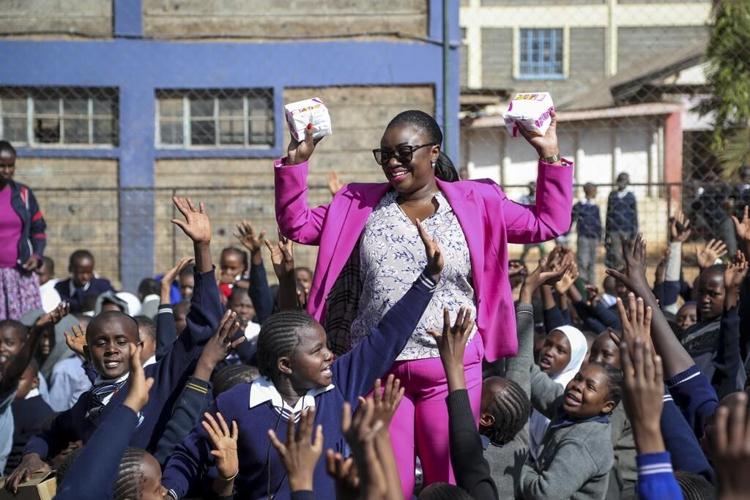NAIROBI, Kenya (AP) — The sight of a red bloodstain on Kenyan Senator Gloria Orwoba's white pantsuit was so startling that a female security guard rushed over to hide it.
It was an accident, Orwoba said. Just before walking into parliament, she looked down to discover that she had been caught unprepared by her monthly period.
For a moment, she considered retreat. But then she thought about how the affects Kenyan women and girls and strode into the building. To those who noticed the stain, she explained she was making a statement.
It didn’t last long. Within minutes, colleagues in the senate became so uncomfortable that another female lawmaker petitioned the speaker to ask Orwoba to leave and change her clothes. Male colleagues agreed, calling the issue “taboo and private,” and Orwoba walked out.
Women make up less than a third of Kenya’s senators: 21 of 67.
A male colleague accused her of faking her accident in parliament, to which she replied in a local media interview that “everyone would rather think it's a prank, because if it is a prank then it's acting and that way it doesn’t exist in the real world. Yet our girls are suffering.”
Whether or not Orwoba's menstrual stain was an accident or a stunt, the controversy it has elicited shows the considerable stigma that surrounds women's periods in Kenya and in many African countries.
Orwoba hasn’t been silenced. The incident last month has inspired considerable debate in Kenya about “period shaming” of women and the problem of the lack of access to sanitary pads for schoolgirls and others in many African countries.
Inspired, some of Orwoba’s friends have even paid for a billboard in the capital, Nairobi, that shows her in a white T-shirt with the words “I can do bleeding” — a spirited message against menstrual stigma in the largely conservative country.
In an interview with The Associated Press, the bubbly first-time senator acknowledged that the incident has prompted her to concentrate on drafting a bill calling on the Kenyan government to provide an annual supply of sanitary pads to all schoolgirls and incarcerated women.
“For legislators to feel the urgency of legislating things into law, they must be subjected to the advocacy and the noise,” she said of her public campaign.
The 36-year-old said she has never understood why menstruation is spoken of like a secret. She recalled being excited as a teenager to finally have her first period after being the last among her peers to get the “mark of womanhood.”
“My attitude toward menstruation since then has been open,” said Orwoba, who has warned her teenage son to never shame a girl for having her period.
Studies have shown that menstruation causes widespread absences from school in many African countries by girls who stay home for fear of staining their uniforms.
In 2019, one schoolgirl in Kenya killed herself after a teacher called her dirty and kicked her out of class.
One in 10 African schoolgirls misses school during menstruation, according to a U.N. survey, and many, after lagging behind, eventually drop out.
Official efforts and promises to provide sanitary pads have fallen short. In Kenya, the government increased budget funds to distribute pads to schoolgirls in 2018 but the amount was halved the next year.
Neighboring Tanzania removed taxes on sanitary pads to make them more affordable, but many still find them too expensive because of high production and import costs.
Now Orwoba receives calls from organizations that want to make menstruation products accessible to the poor, including a British firm that wants to put up sanitary pad dispensers in public toilets. Such dispensers for condoms have long been common in public toilets across Kenya as part of national campaigns against HIV.
In recent years, Kenya has seen the introduction of reusable menstruation products like washable pads and silicon cups. But the lack of access to water to clean them in some rural communities has prevented some users from embracing them.
Virginia Mwongeli, 24, sells menstruation cups in Nairobi and thinks Orwoba’s bold move will help end period shaming.
“We need to normalize periods,” she said.
The senator’s decision to walk into parliament with stained pants was “totally acceptable as people need to openly discuss menstruation,” said Lorna Mweu, popularly known as Mamake Bobo, who founded Period Party, an organization that holds an annual event in Kenya to help end stigma.
Orwoba said she longs for the day when accidental period stains will be seen as normal, not shameful. Women and girls are using up valuable sanitary pads by wearing them as a precaution out of anxiety, she said: “That’s a whole pack that you’ve wasted because of the fear of staining your clothes.”










































